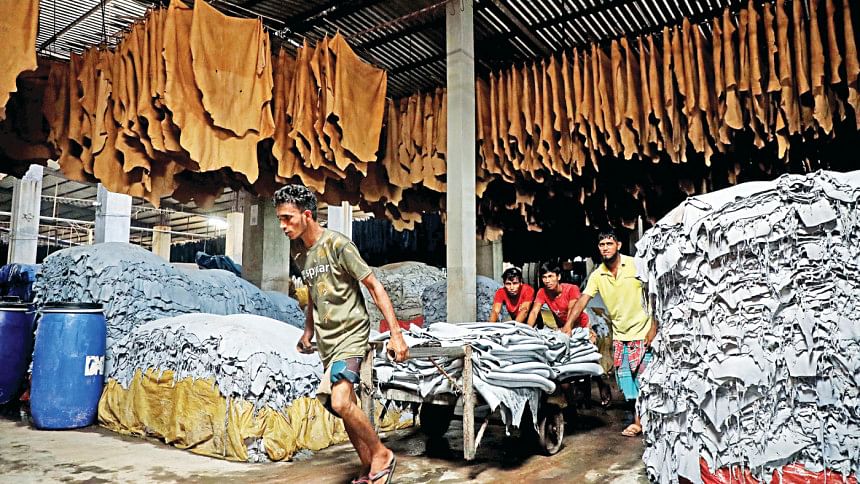Bangladesh’s leather exports to benefit from CETP upgrade

The government up until now has allowed two tanneries of Apex and Bay Leather to set up their own effluent treatment plants and other companies are waiting for permission for theirs as well, according to industry people.
The move comes as a part of the government's efforts to reduce pressure on the central effluent treatment plant (CETP) at the tannery industrial estate in Savar, Dhaka by encouraging the private firms to set up their own.
The government and tannery owners should both play a role in upgrading the CETP to realise the full potential of the leather sector through the expansion of the production of associated products, they said.
Bangladesh urgently needs to upgrade effluent treatment systems in the country in order for local leather companies to gain Leather Working Group (LWG) certification, they said.
The LWG is a global body for compliance and environmental certification in the leather and leather goods sector. The certificate is mandatory for market access to Europe, the US and some developed Asian countries.
The LWG certification will open new avenues for local manufacturers to use leather for the manufacture of exportable products, they added.
Till date, only five tanneries in the country have attained the LWG certification – Apex Tannery, Riff Leather, SAF Industries, Superex Leather, and ABC Leather.
As per data of Bangladesh Tanners Association (BTA), there are around 200 tanneries in the country and 127 of them are based inside the estate.
These tanneries can collectively produce about 300 million square feet of finished and semi-finished leather each year.
Of all the leather produced, 80 percent is exported at low prices to China as local manufacturers cannot use the materials for manufacturing export products in the absence of the LWG certification.
"The CETP is in operation but cannot fully cover demand during the peak season after Eid-ul-Azha," said Golam Shahnewaz, managing director of Dhaka Tannery Industrial Estate Waste Treatment Company.
"During the peak season, there is a demand to treat 40,000 cubic feet of effluent each day while the CETP has a capacity of up to 25,000 cubic feet," he told The Daily Star yesterday.
At present, the CETP processes some 14,000 to 17,000 cubic feet of effluent per day.
Shahnaz also said there were two ways to increase the treatment capacity – through either government or private tanners' initiatives.
According to him, a detailed project plan for upgrading the CETP's capacity by at least 15,000 cubic feet is underway.
Shahnaz believes that there would be no obstacle for local leather companies to avail the LWG certifications once the CETP's capacity was raised.
Abul Kalam Azad, president of Tannery Workers Union, said tannery owners should set up their own effluent treatment plants if they have the financial capacity so as to reduce pressure on the government and CETP.
He also said due to a lack of LWG certifications, tannery owners were deprived of fair prices while global brands were refraining from purchasing finished leather and leather goods from Bangladesh.
For this reason, some tanneries do not have work year-round, which leads to the layoff of workers, Azad alleged.
Md Mizanur Rahman, director of Samota Leather Complex Ltd in Savar, said at least 15 tanneries would be able to get the LWG certification if the CETP was upgraded as they had already meet other requirements.
According to him, all tanneries will need the LWG certification to export products.
Rahman said it would take just six months to upgrade the existing CETP and that they were in correspondence with an Italian company to this end.
"Tannery owners and exporters of leather goods will both benefit as the exporters will be able to use the locally processed leather," he said.
Rahman, also vice president of the BTA, believes that the leather sector can earn at least $5 billion from exports every year after achieving a substantial number of LWG certifications.
The leather sector earned $1.24 billion last fiscal year from the export of leather and leather products while it was $941.67 million in the previous fiscal year.

 For all latest news, follow The Daily Star's Google News channel.
For all latest news, follow The Daily Star's Google News channel. 


Comments